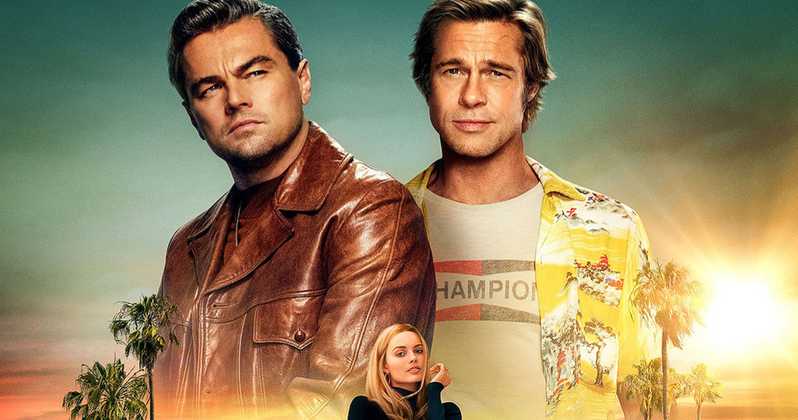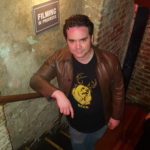
The ninth and (if he’s sticking to his guns, and there’s no reason to doubt that he is) penultimate film by Quentin Tarantino opens with a primetime interview with Leonardo DiCaprio‘s Rick Dalton, star of the cowboy program, Bounty Law, explaining the unique relationship he holds with her scarred, laid back, relaxed stunt man, Cliff Booth (Brad Pitt).
Highlighting the dangers, both mundane, and extreme, that his job entails, this brief introduction ends with the interviewer moving on and introducing the night’s following program, almost as if indicating newer and exciting things are on the horizon. As it stands, newer and exciting things are on the horizon– just not necessarily for Rick and Cliff…
Inspired by the rocky and brotherly relationship between the late Burt Reynolds (who was cast as George Spahn, the owner of the land housing Manson’s “family”, a role that eventually went to Bruce Dern after Reynolds’ sad passing late last year) and his stuntman-director buddy Hal Needham, OUATIH is as much a reflective piece about Tarantino himself –and his career– as it is a piece of revisionist historical escapism; it’s a genre that he’s been experimenting to varying degrees of success, and controversy, for some time now. Coming to terms with growing older, and the possibility of obsolescence, is a theme Tarantino explored in (my absolute personal favorite of his) Jackie Brown, but here, exploring this possibility as a much older man, Tarantino’s latest is tinged with a bit of melancholy, and a deliberate change in pacing and tone.
Sure, there’s fun and banter, and most of the movie’s 3-hour runtime (and plot) hinges on Cliff and Rick meandering about around Los Angeles, circa August 1969; but it’s not so much a wistful reflection of halcyon days, as it is a slightly rose-colored apprehension about the uncertainties of the future. Yes, his soundtrack is, as his usually are, lush with the sounds of the time, a thing to be played on repeat until the lyrics are fully stuck in your head (as a lot of them already were. I was surprised at how many I instantly recognized, having run the gamut from Aretha Franklin to Simon and Garfunkel). The cast is spot-on, and the litany of performances –and there are way too many to go through here– are utterly perfect, as any Tarantino film would be.
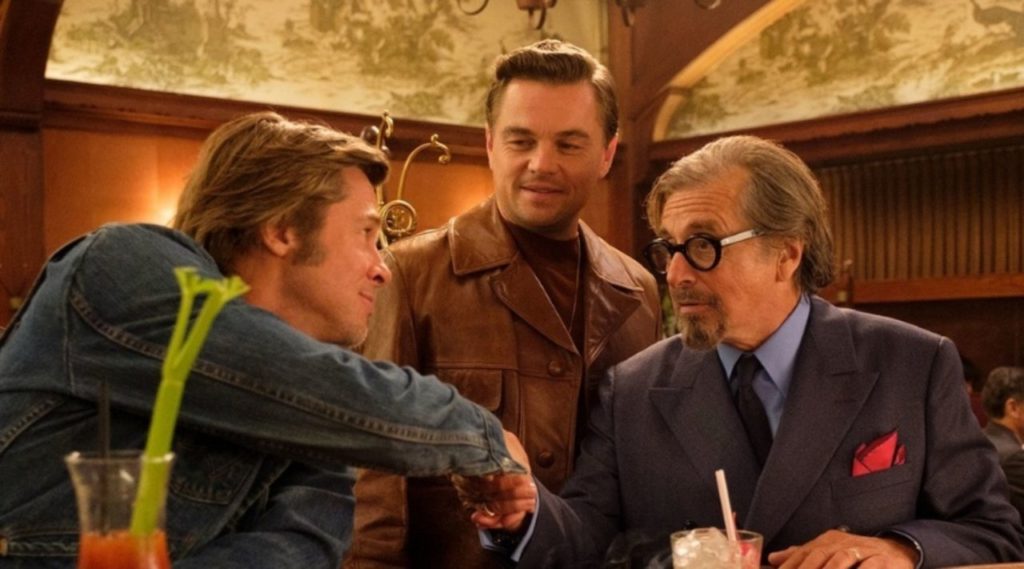
By now, you’ve noticed I’ve not mentioned any details of the plot…that’s a deliberate choice, and one that Tarantino himself requested reviewers respect, so I’m doing so here. And really, this is a movie less about moments and plot, as it is about the bonds between close friends, and the “what if?” fantasy of where history could have gone. Rick is a shell of his former self: a mostly-functioning alcoholic trying to navigate what will become the New Hollywood of the 1970s… Westerns have been waning in popularity since for years, and even the guest starring roles — in the primetime shows he used to headline — he takes find him barely recognizable under thick makeup.
Cliff’s just happy to tag along, ostensibly as his chauffeur and handiman, making sure Rick is on set on time, and functioning enough to make it through a day at work. And through all this dances Sharon Tate (an effervescent Margot Robbie), wide-eyed about her role in the latest Matt Helm movie, and reveling in her relationship, and upcoming baby, with the hottest director of the moment, Roman Polanski (Rafel Zawierucha), who just so happen to live next door, and down the hill, to Rick. And, unbeknownst to any of them, their paths are destined to cross with Charles Manson (Damon Herriman), and his “family”.
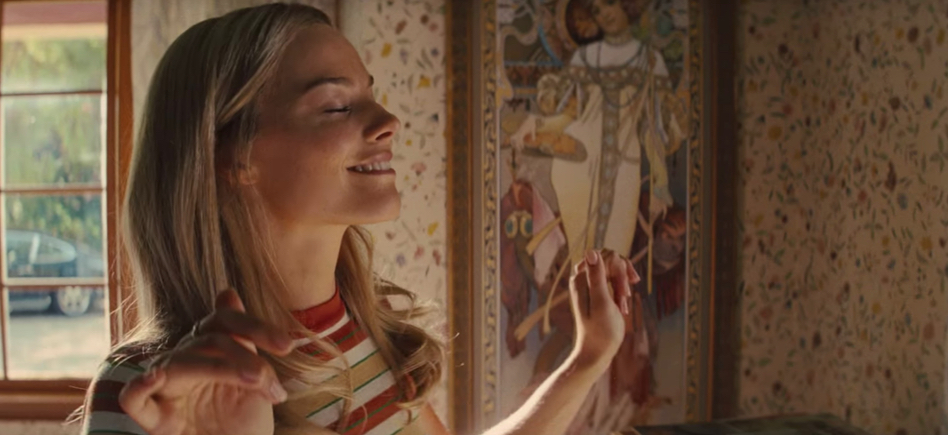
Knowing as little as possible walking into this film is recommended, not necessarily for the risk of spoilers, but in order to luxuriate in the deep hues and bright neon lights of DP Robert Richardson’s camera work, and in the staccato tempo of Tarantino’s elegiac script. Here, Tarantino is at one of his most restrained moments, exhibiting a level of patience not seen since the aforementioned Jackie Brown. In two instances, Tarantino stages entire lengthy scenes from the Western Rick finds himself guest-starring in, playing off of James Stacey (an excitably elegant Timothy Olyphant) and James Maunder (a subdued Luke Perry, in his last screen role).
Here, DiCaprio showcases what I often consider one of the most impressive types of performances: a renowned, skilled actor playing an actor who at first can’t act, and then improves completely (think of Naomi Watts in Mulholland Drive, and how utterly, insanely good she is when her character, Diane, goes to audition…juxtaposed against her purposeful performance throughout the entire rest of that movie). These scenes are among the best of any of DiCaprio’s work with Tarantino, and his breakdown in his trailer after botching his lines is exactly the sort I’ve witnessed and heard of more than once, working on sets in my past lives. And it’s one of the funniest sequences in a litany of hilarious sequences.
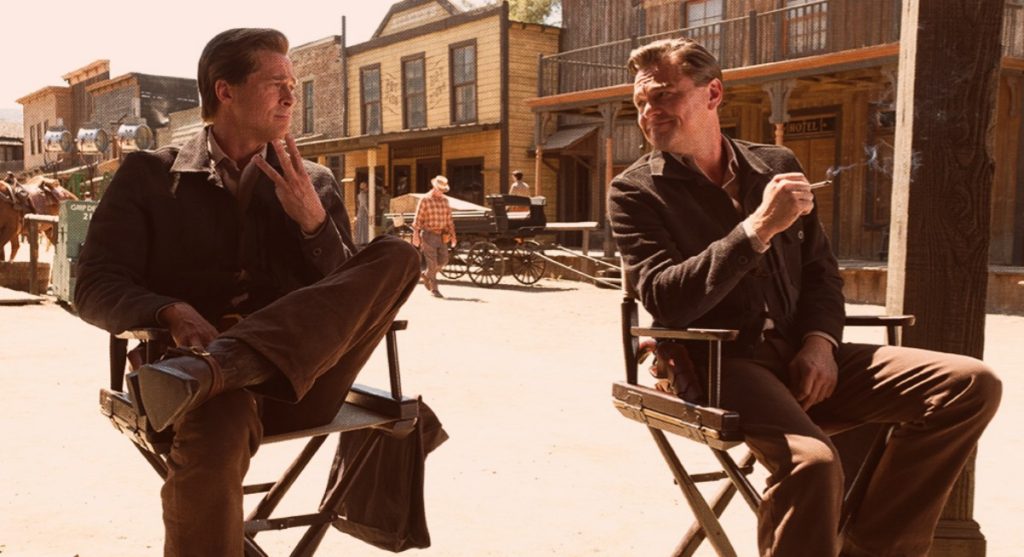
Cliff, on the other hand, is as meandering as the film. While Rick’s scenes often focus on great indecision and uncertainty…and the tone and pacing reflects that, at times bouncing from perspective, scene, and in his introduction to James Stacey, a few frames are deliberately cut, creating an odd jump-cut that goes barely noticed. Cliff’s scenes often meander without a care in the world. Carefully and deliberately paced, Cliff seems at home driving (recklessly, and at times seemingly aimlessly), and we come to know him as he seems at home wherever he finds himself.
While he seems to have little ambition, the scars on his body show a life fully lived, and he has no objection to jumping up and into action the second Kurt Russell‘s stunt coordinator Randy begrudgingly gives him a job, nor turns down a chance to tussle with Kato himself, Bruce Lee (Mike Moh…and before we go talking about insensitivity to Bruce Lee, stop right now, go watch The Dragon Lives Again, and then get back to me). But Cliff’s aloofness is never once transmitted as lazy, or dumb: as soon as he suspects something might be amidst at Spahn Ranch, he ingratiates himself, refusing to leave until confirming Spahn is well, taken care of, and not being taken advantage; here, the buildup is perfect, as each seemingly-bullshit explanation for why Spahn can’t talk in person turns out to be absolutely true.
And it’s actually this scene that shows the core, the heart of OUATIH: Cliff and Spahn had not seen each other in nearly a decade, and for all Cliff knows, Spahn completely forgot who he was, as their time together was so brief– and, at times, he does seem to forget who he is. Yet, despite all that, Cliff insists on patiently reintroducing himself, making sure that Spahn is completely cognizant of everything going on around him, and willingly helping the Manson “family”. It’s here that Spahn speaks the anti-thesis of the film: “Not everybody needs a stuntman.”
And yet, over and over, we find that, for at least Rick and Cliff, they do need each other as “stuntman”. While it would be easy to confuse Cliff for Rick’s sidekick, in truth they alternate that role for each other. Rick provides Cliff with employment, even if it isn’t always doing stuntwork, and gives him a purpose that he otherwise wouldn’t have on his own. On the other hand, while Cliff does drive Rick around to his errands and do his handiwork, it’s Cliff who keeps Rick to a steady schedule, making sure he remembers his appointments, and –perhaps most tellingly– even gives Rick his own sunglasses to hide Rick’s hungover eyes.
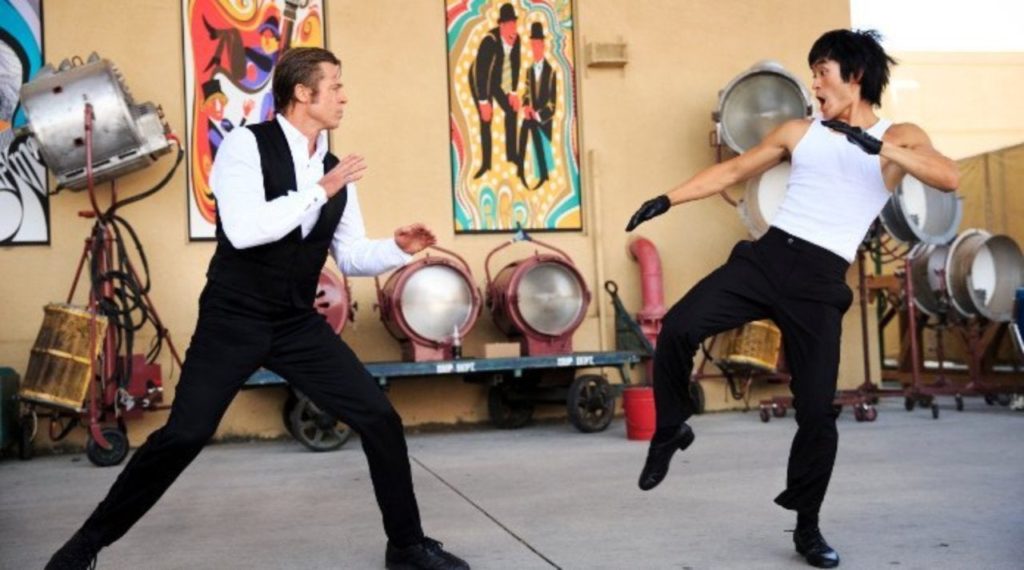
These are two men who know each other intimately, and who understand each other’s needs: Cliff is content to live in a trailer behind a drive-in, and would perhaps chafe within the confines of any larger than that; Rick, meanwhile, needs that someone to get drunk with and watch reruns of his guest spots on Friday night. So even when the time comes for their relationship to seemingly end, neither man has an ill word. It’s how things are run.
And while the climax (which I won’t talk about at all) shifts the focus nearly entirely to Cliff, it ends with both men at a fuller understanding. A stuntman, so Tarantino shows, is someone who goes beyond friendship: they’re the drinking buddy, the gofer, the driver, the friend…but they’re also the person to hide your alcoholism, to keep you and your life on track, and to, yes, literally take the falls and scars that you won’t. They risk their lives for entertainment, so that someone else can get all the credit and fame. And that’s how it is. Cliff isn’t in it for glory…he’s in it to be with his buddy. Literally risking his life for someone else.
So maybe Spahn was only half right; not everybody needs a stuntman. Sometimes we need to be one for someone else. 5/5 Endless Bloody Marys.
-J.L. Caraballo

